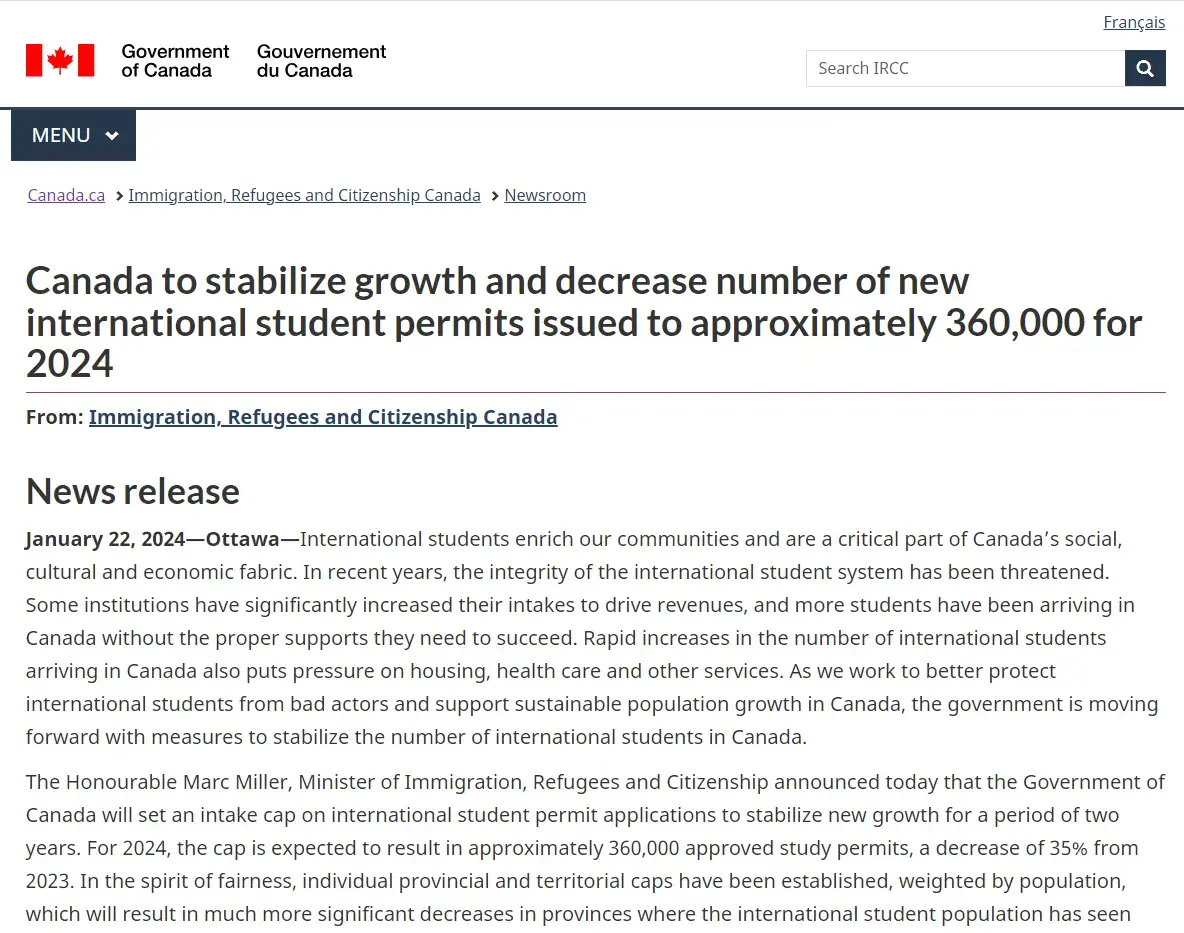今天,加拿大移民局发布了关于2024年学签申请的最新政策更新。这次新政发布的标题为 《加拿大将稳定增长并将2024年新发放的国际学生许可证数量减少至约36万份》 ,根据这次新政的内容,金珈迅总结出以下要点:
学签许可减少35%: 2024年加拿大的学签许可数量将比2023年减少35%,但这不包括硕士和博士、中小学以及续签申请。
省份提供的证明信: 申请学签需要提供当下省份提供的证明信,但这项规定不适用于硕士和博士、中小学的申请者。
毕业工签资格变化: 从今年9月开始,在私立学院就读公立学院与私校合作课程的国际学生将不再有资格获得毕业工签。
硕士及其他短期研究生课程毕业生: 从硕士课程或其他短期研究生课程毕业的国际学生可能能够申请3年的工作许可,为他们提供更长时间的留在加拿大工作的机会。
配偶工作许可限制: 配偶的开放式工作许可仅适用于攻读硕士和博士学位的国际学生的配偶,这意味着其他学历水平的国际学生配偶可能会面临限制。
具体政策的详细内容仍需等待后续具体文件的发布。近年来,由于留学生数量激增,导致加拿大社会资源紧缺。金珈迅将致力于为大家的留学移民之路提供支持和保障。

以下是原文:
Canada to stabilize growth and decrease number of new international student permits issued to approximately 360,000 for 2024
From: Immigration, Refugees and Citizenship Canada
News release
International students enrich our communities and are a critical part of Canada’s social, cultural and economic fabric. In recent years, the integrity of the international student system has been threatened. Some institutions have significantly increased their intakes to drive revenues, and more students have been arriving in Canada without the proper supports they need to succeed. Rapid increases in the number of international students arriving in Canada also puts pressure on housing, health care and other services. As we work to better protect international students from bad actors and support sustainable population growth in Canada, the government is moving forward with measures to stabilize the number of international students in Canada.
January 22, 2024—Ottawa— International students enrich our communities and are a critical part of Canada’s social, cultural and economic fabric. In recent years, the integrity of the international student system has been threatened. Some institutions have significantly increased their intakes to drive revenues, and more students have been arriving in Canada without the proper supports they need to succeed. Rapid increases in the number of international students arriving in Canada also puts pressure on housing, health care and other services. As we work to better protect international students from bad actors and support sustainable population growth in Canada, the government is moving forward with measures to stabilize the number of international students in Canada.
The Honourable Marc Miller, Minister of Immigration, Refugees and Citizenship announced today that the Government of Canada will set an intake cap on international student permit applications to stabilize new growth for a period of two years. For 2024, the cap is expected to result in approximately 360,000 approved study permits, a decrease of 35% from 2023. In the spirit of fairness, individual provincial and territorial caps have been established, weighted by population, which will result in much more significant decreases in provinces where the international student population has seen the most unsustainable growth. Study permit renewals will not be impacted. Those pursuing master’s and doctoral degrees, and elementary and secondary education are not included in the cap. Current study permit holders will not be affected.
IRCC will allocate a portion of the cap to each province and territory, who will then distribute the allocation among their designated learning institutions. To implement the cap, as of January 22, 2024, every study permit application submitted to IRCC will also require an attestation letter from a province or territory. Provinces and territories are expected to establish a process for issuing attestation letters to students by no later than March 31, 2024.
These temporary measures will be in place for two years, and the number of new study permit applications that will be accepted in 2025 will be re-assessed at the end of this year. During this period, the Government of Canada will continue to work with provinces and territories, designated learning institutions and national education stakeholders on developing a sustainable path forward for international students, including finalizing a recognized institution framework, determining long-term sustainable levels of international students and ensuring post-secondary institutions are able to provide adequate levels of student housing.
In order to better align the Post-Graduation Work Permit Program, we are changing the eligibility criteria:
- Starting September 1, 2024, international students who begin a study program that is part of a curriculum licensing arrangement will no longer be eligible for a postgraduation work permit upon graduation. Under curriculum licensing agreements, students physically attend a private college that has been licensed to deliver the curriculum of an associated public college. These programs have seen significant growth in attracting international students in recent years, though they have less oversight than public colleges and they act as a loophole with regards to post-graduation work permit eligibility.
- Graduates of master’s and other short graduate-level programs will soon be eligible to apply for a 3-year work permit. Under current criteria, the length of a postgraduation work permit is based solely on the length of an individual’s study program, hindering master’s graduates by limiting the amount of time they have to gain work experience and potentially transition to permanent residence.
In the weeks ahead, open work permits will only be available to spouses of international students in master’s and doctoral programs. The spouses of international students in other levels of study, including undergraduate and college programs, will no longer be eligible.
The important measures announced today complement other recently announced reforms to the International Student Program. Taken together, they aim to ensure genuine students receive the support they require and have the resources they need for an enriching study experience in Canada, while at the same time stabilizing the overall number of students arriving and alleviating pressures on housing, health care and other services in Canada.